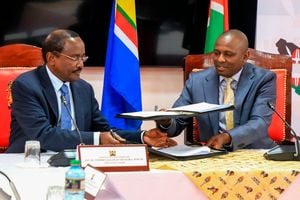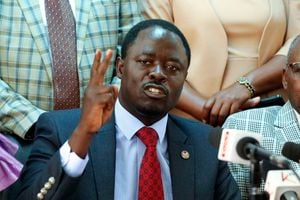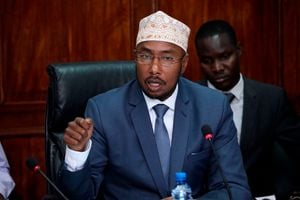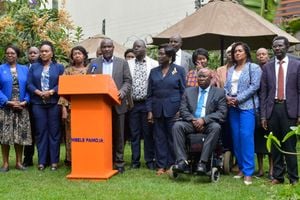
A voter drops a ballot in a transparent ballot box against the background of the Kenya national flag. The 2027 General Election will still be marred by countless election petitions.
The 2027 General Election will still be marred by countless election petitions, as has been the case since the promulgation of the 2010 Constitution, should several legal and political amendments not be addressed on time, experts have warned.
This is according to the recently released Compendium of 2022 Election Petitions prepared by the Kenyan section of the International Commission of Jurists (ICJ-Kenya), which highlighted numerous gaps that pose the risk of subjecting subsequent electoral processes to legal cases and even getting overturned.
Key among the issues highlighted by the report include the failure by Parliament to operationalise the regulation of campaign financing, amendment of electoral laws right before elections, lack of harmony in regulations that provide for the powers of the Independent Electoral and Boundaries Commission (IEBC) chairperson as well as lack of clear direction on the standard of proof when litigating electoral petitions.
Another key challenge is the fact that Section 80 of the Elections Act lists the various powers of an election court yet it does not confer power to review its decisions to the election court has resulted in a lack of clarity on how courts should pronounce themselves in solving electoral disputes.
In the 2022 General Election, one of the main issues challenged in court by the petitioners over the presidential results was the powers conferred to the IEBC Chairperson.
The Compendium noted that there was “lack of clarity in the policy and oversight responsibilities of the chairperson, CEO and Commissioners of the IEBC”.
Though the electoral landscape is rough as it is already, the team said, there is still time to rectify the glaring pitfalls with the Compendium, compiled and edited by Electoral Law Expert, Luciana Thuo, recommending a raft of policies and safeguards.
Electoral laws
Crucially, the team recommended that there should be a harmonisation of amendment efforts, especially of the jurisdiction allocated among political parties, the IEBC and the Political Parties Disputes Tribunal in relation to nomination disputes that have often reared their ugly head in every election cycle.
Also, the team recommended that there should be no amendments made to electoral laws within a year of an election.
Such a situation was witnessed in the run-up to the 2022 elections when parliament enacted the Political Parties Amendment Act No.2 of 2022 which negatively impacted the effective conduct of party nominations.
According to the Elections Act, political parties should submit their nomination rules to IEBC at least six months before a general election.
This however, was not the case in the past elections because of the late amendments that saw many party constitutions remaining unchanged leading up to the 2022 elections yet nomination rules had already been submitted to the Office of the Registrar of Political Parties and IEBC.
“This discrepancy resulted in a mismatch between nomination methods outlined in party rules and those mandated by the Political Parties Act with its ramifications being reflected in the jurisprudence of PPDT and the courts in determining if nomination methods used by parties conformed to the requirements of the amended Act,” the Compendium stated.
Judge Dr Smokin Wanjala, a Supreme Court Judge and Director-General of the Kenya Judiciary Academy, argued that there should be operational legal frameworks and structures in political parties and all other institutions involved in solving electoral disputes to save the court time in solving “issues that could be solved at the party level. Failure to do this, he cautioned, will result in a flurry of cases being taken to court.
“In advanced democracies there are usually, very rarely disputes that emanate from the electoral process. In a fragile democracy such as ours, there are certain things that are not adhered to whatever the law provisions in the constitution and therefore it means disputes will emanate from an electoral process,” Justice Dr Wanjala said.
To have a fair representation of the marginalised communities as well as persons with disabilities, the Compendium said the IEBC should put proper structures to guarantee the full enjoyment of their rights and freedoms.
This, for instance they said, could be the provision of documents in braille for visually impaired candidates.
Electoral disputes
The other matter the team handled was the use of “shall” and “may”, which was yet again a subject of discussion when it comes to determining the standard of proof in electoral disputes.
Section 87 (1) of the Elections Act, 2011 states that an elections court is to determine if an election offence “may have occurred” thus resulting in further legal proceedings on the same matter. Before the new constitution, the phrase used was “shall”, thus giving the court autonomy to fully pronounce itself on an electoral dispute.
However, the current phrase “shall” the Compendium argues, suggests that the court should use the civil standard of proof in determining whether such malpractices have affected the validity of an election.
“The fact that the finding of an election court on the possible commission of an election offence is collateral to its main findings in the petition makes the actual election offence an ancillary finding. If therefore on the basis of this ancillary finding, a person is found to have committed an election offence, and they are therefore subjected to a criminal proceeding, does it not amount to being tried twice for the same set of facts?” the report posed.
To solve this, the Compendium called on the Supreme Court to pronounce itself and clarify Section 87 before the next elections.
For the effective oversight of the responsibilities of the Chairperson, CEO and the Commissioners of IEBC, the report called for the full adoption of the Supreme Court recommendations that the Commission should establish formal internal guidelines to delineate strategy, policy and oversight responsibilities of the aforementioned positions.
“It (Supreme Court) further suggested that roles for IEBC officials and third parties be explicitly defined in both legislative and administrative directives to ensure clarity and accountability,” the Compendium stated.
Whereas the Supreme Court declared Section 87 (2) of the Elections (General) Regulations unconstitutional for conferring the IEBC chairperson power to solely verify and tally results at the national tallying centre; Regulation 83 (2), confers an identical power but was not referred to by the court, the team observed.
The Compendium recommends that the process of law reform is taken and these Regulations amended to do away with the confusion.
In matters of campaign finance regulation, the report called for the amendment of Section 29(1) of the Electoral Campaign Financing (ECF) Act to remove the requirement to table ECF Regulations in Parliament before gazettement.
“There should also be a harmonisation of requirements for independent candidature and political party candidature to ensure that the former party is not treated differently,” the team recommended.
In the run-up to the 2022 elections, independent candidates, unlike political party candidates, had to submit copies of their supporters’ identity cards, something that highlighted a disparity in the requirements for demonstrating community support.
“To have a fair representation of the marginalised communities as well as persons with disabilities, the IEBC should put proper structures to guarantee their full enjoyment of their rights and freedoms. This, for instance, could be the provision of documents in braille for visually impaired candidates,” the Compendium recommended.









